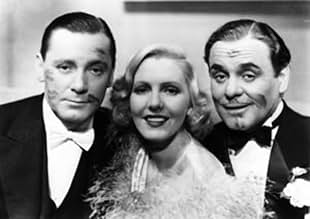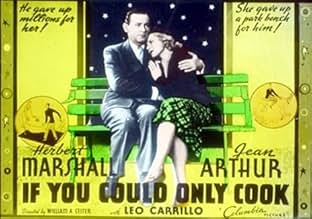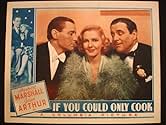IMDb RATING
7.0/10
1.5K
YOUR RATING
An executive lets an attractive cook talk him into taking a job as butler.An executive lets an attractive cook talk him into taking a job as butler.An executive lets an attractive cook talk him into taking a job as butler.
- Director
- Writers
- Stars
Frieda Inescort
- Evelyn Fletcher
- (as Frieda Inescourt)
Mariska Aldrich
- Swedish Cook
- (uncredited)
William Anderson
- Newsboy
- (uncredited)
John Ardell
- Member of Board of Directors
- (uncredited)
William Arnold
- Second Inspector
- (uncredited)
William Begg
- Wedding Guest
- (uncredited)
Wyrley Birch
- Minister
- (uncredited)
Joan Blair
- Kate
- (uncredited)
Ralph Brooks
- Wedding Guest
- (uncredited)
- Director
- Writers
- All cast & crew
- Production, box office & more at IMDbPro
Featured reviews
The Austin Film Society showed this entertaining old film last week on election night. The receptive audience found laughs in many lines that still seem current, especially about unemployment, the want ads and being broke.
Jean Arthur looked lovely in this movie, and Herbert Marshall was perfect. What a wonderful voice that man had! My husband thinks that his walk may have inspired C3PO's formal motions, although the robot had a metal leg, not a wooden one like Mr. Marshall's.
Lionel Stander was already in full bellow, many decades before 'Hart to Hart', and Leo Carillo was a treat as the gangster employer. It was a surprise to hear them use the term 'wise guy' for a prospective member - I didn't realize it was already being used back then.
Jean Arthur looked lovely in this movie, and Herbert Marshall was perfect. What a wonderful voice that man had! My husband thinks that his walk may have inspired C3PO's formal motions, although the robot had a metal leg, not a wooden one like Mr. Marshall's.
Lionel Stander was already in full bellow, many decades before 'Hart to Hart', and Leo Carillo was a treat as the gangster employer. It was a surprise to hear them use the term 'wise guy' for a prospective member - I didn't realize it was already being used back then.
this movie is in the spirit of pursuing your dreams and following your heart. it's the wonderfully silly story of a auto designer whose company wants to keep making what sells rather that try his new designs. while soul-searching in the park he meets unemployed Jean Arthur who thinks he's down on his luck also. she sees a job for a married couple (a live in butler and cook), turns to him and ergo, the title. anyway, it's a lot of fun. for some reason this isn't available on video and isn't shown on TCM etc. so i had to find a copy on eBay. and now our town is having a Jean Arthur film festival (why didn't they consult me!? :-)). this is my favorite of Jean Arthur's movies not available on video, followed by Party Wire.
Herbert Marshall is quite charming as an automobile tycoon who chances upon unemployed, nearly-homeless Jean Arthur in the park; he conceals his true identity and lands them both jobs at the home of a wealthy racketeer (he as the butler, she as the cook); however, his impending marriage to a society girl might put an end to the charade. Whimsical fluff, silly yet put over with so much professionalism that one isn't apt to complain too loudly. Arthur creates a likable character and has some very cute scenes (especially her cooking audition with the garlic). Her conversation with Marshall early on about "200 people for every one job" is still remarkably relevant in the 21st century, though this thin premise is nearly stretched to the breaking point. Worth-seeing for the performances, and fans of nutty '30s comedies will surely enjoy it. **1/2 from ****
"If You Could Only Cook" is a small film apparently credited to Frank Capra at one point but actually not by Capra, made in 1935, and it stars Herbert Marshall, Jean Arthur, Lionel Stander and Leo Carillo. Carillo was the Cisco Kid's sidekick Pancho on the TV series that boomers may remember; and Lionel Stander's unmistakable voice will be remembered from the Robert Wagner TV show "Hart to Hart." This is a film made during the Depression, and it concerns a wealthy auto executive named Jim Buchanan (Herbert Marshall) who is about to be married to the right kind of woman and is dreading it. While sitting on a park bench trying to escape his board of directors and his fiancé, he meets a down to earth young woman (Jean Arthur) who is desperately looking for a job and can't find anything. Plus, she's just lost her room. She finds a job that pays well, but it's for a couple. She talks Jim into applying for it with her -- he's the butler and she's the cook in the home of a gangster (Carillo). Thanks to her sauce, she is hired. Thus begins Buchanan's double life. You can guess the rest.
A very charming movie with a delightful performance by Arthur and a good one by Marshall. It's always hard to believe that Herbert Marshall was ever a leading man given the roles he had later on, but he was a type that went out of style -- very formal, well spoken, a little stuffy, modeled on the British. Films in the '30s were often based on plays, and the plays of that era dealt with class differences.
Capra initiated a lawsuit against Columbia for crediting him with this film in England, where he was very popular, but Harry Cohn purchased "You Can't Take It With You" for him in exchange for dropping the suit. So a little film, never seen by Capra, paid him a big dividend.
A very charming movie with a delightful performance by Arthur and a good one by Marshall. It's always hard to believe that Herbert Marshall was ever a leading man given the roles he had later on, but he was a type that went out of style -- very formal, well spoken, a little stuffy, modeled on the British. Films in the '30s were often based on plays, and the plays of that era dealt with class differences.
Capra initiated a lawsuit against Columbia for crediting him with this film in England, where he was very popular, but Harry Cohn purchased "You Can't Take It With You" for him in exchange for dropping the suit. So a little film, never seen by Capra, paid him a big dividend.
This dry, low-key romantic comedy is very satisfying. Arthur is excellent, and Marshall is well cast as an automobile executive who wants to get away from his stuffy board of directors and his pushy fiancé, and finds happiness posing as a butler (initially so that Arthur can get work as part of a butler-cook team). Lionel Stander (as he often does) steals the show as the acerbic sidekick of gangster Carillo, and he's given some great lines. Carillo is pleasing, too, as the gangster who wants to live like the gentry, and who's romantically interested in Arthur, but who's willing to hold back because he's a gourmet and is even more interested in retaining her as a cook. The best thing about the film is that it never gets tripped up in excessive plot complications, or telegraphs its humor. Giving Carillo a gustatorial as well as romantic interest allows him to take certain actions without burdening the romance of the principals. And, after giving us enough of a glimpse of the snotty fiancé to know what Marshall's in for, the film has the grace not to show her face again; no silly "scheming" or tiresome bared claws. In the final scene, when all are trying to convince Arthur through a locked door that she should marry, they move from straight arguments to playing roles in a "routine," but there's no winking and signaling to signify a change in technique, it just flows quickly and naturally. The film has enough confidence in the unfolding of the relationship between the principals that the intrusion of other characters and mechanical "plot complications" can be kept to a minimum Thus Carillo's proposal and interference at the denouement serves mainly to allow Arthur to voice her feelings about Marshall, and Carillo actually brings them together rather than holding them apart. Nice film.
Did you know
- TriviaIn order to cash in on Frank Capra's popularity in England, Columbia Pictures released this film in London as "A Frank Capra Production, produced by Frank Capra." Capra, who had never even seen the film, was furious. This led to a bitter year-long dispute between head of Columbia Harry Cohn and Capra, who sued the studio for libel. It almost cost Cohn his job and almost resulted in Capra leaving the studio. It was resolved when Cohn relented and promised to buy for Capra the rights to the play "You Can't Take It with You" for $200,000, and pay him some back salary if he would drop the suit. Capra did.
- GoofsWhen Rossini pulls up to tell his gang the hit is off, a reflection of the boom microphone is visible on the trunk of his car, lower right of the frame.
- Quotes
Mike Rossini: Well, how a nice girl like you happened to get hooked up with a mug like that?
Joan Hawthorne: He isn't a mug.
Mike Rossini: Well, how he happen to sell you that bill of goods? How you happen to fall for him?
Joan Hawthorne: The Depression.
- ConnectionsFeatured in The Lady with the Torch (1999)
- SoundtracksBridal Chorus (Here Comes the Bride)
(uncredited)
from "Lohengrin"
Written by Richard Wagner
[Played on piano by Walter Byron at the wedding rehearsal, reprised by the band at the wedding]
- How long is If You Could Only Cook?Powered by Alexa
Details
- Release date
- Country of origin
- Official site
- Languages
- Also known as
- Wenn sie nur kochen könnte
- Production company
- See more company credits at IMDbPro
- Runtime
- 1h 12m(72 min)
- Color
- Aspect ratio
- 1.37 : 1
Contribute to this page
Suggest an edit or add missing content






























